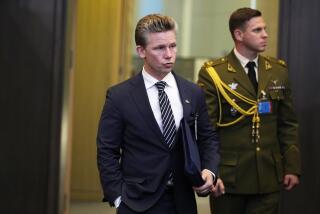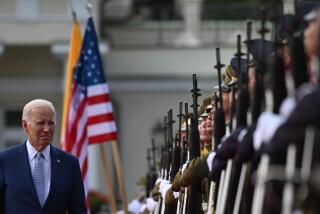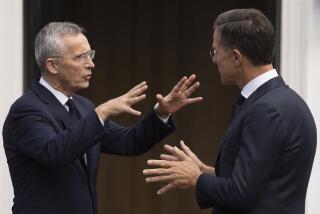Soviets Told Not to Fear German Membership in NATO : Diplomacy: The alliance hopes to persuade Moscow not to oppose unification when talks open Saturday.
BRUSSELS — NATO Secretary General Manfred Woerner moved Thursday to reassure the Soviet Union on behalf of the Western alliance that a united German membership in NATO would pose no threat.
His statement was viewed here as a way of attempting to ensure that the Kremlin will not seek to prevent German reunification at talks opening Saturday in Bonn among the two Germanys and the four victorious World War II nations--the Soviet Union, the United States, Britain and France.
“We have no intention of shifting the military balance in Europe to the detriment of the Soviet Union,” Woerner told a news conference at a meeting of the foreign ministers of the 16-nation North Atlantic Treaty Organization, which strongly supported a united Germany on Thursday.
“We want to take into account the legitimate security of the Soviet Union,” he added.
Woerner, a former West German defense minister, spoke after U.S. Secretary of State James A. Baker III put forward an American arms proposal to speed up talks on reduction or elimination of short-range nuclear weapons in Europe.
Woerner and Baker are developing a strategy, according to NATO sources here, that would persuade Moscow not to oppose NATO membership for a united Germany as the price of that unification. The Soviet Union has repeatedly warned, in varying tones and with different voices, that it will not agree to a unified Germany becoming a member of the alliance.
However, in a statement that reflected the message he and Baker wish to convey to Soviet President Mikhail S. Gorbachev, Woerner declared:
“Our mission is clear. This is not a game of winning or losing: At the end, there will only be winners. The Soviet Union will not lose. It will gain--in stability and in security.”
Woerner said the American proposal to advance the talks on eliminating short-range, land-based nuclear weapons in Europe reinforces NATO’s long-held assertion that its strategy is “defensive.”
West German Foreign Minister Hans-Dietrich Genscher, after the meeting, also backed the Bush Administration’s proposals, declaring that they would support “Gorbachev’s policies,” which he approved.
Genscher and West German Chancellor Helmut Kohl have chaffed recently under the NATO policy of basing short-range missiles--those with a range of less than 300 miles--and even shorter range nuclear-tipped artillery shells in West Germany.
The presence of the U.S.-owned shells, which could only be used to hit what is now East German territory, is a potent political issue in West Germany, particularly in light of the democratization of East Germany and other countries in the old Soviet Bloc and the impending unification of Germany.
NATO’s agreement to drop a program of modernizing the short-range Lance nuclear missile now deployed and to explore reductions in nuclear artillery would give a political boost to the ruling coalition of Christian Democrats that Kohl leads and the Free Democrats led by Genscher in the next election, scheduled for December.
Further, the prospect of eliminating all short-range nuclear weapons is seen as a major offer that could allay Soviet fears of a united Germany being a member of NATO.
In a briefing, Genscher pledged that a united Germany would rule out possessing any nuclear, biological or chemical weapons. And Woerner raised the possibility that eventually NATO would agree not to base any nuclear weapons on German soil.
Genscher has been the leading Western political figure to suggest that NATO find a way to allow Gorbachev and the marshals of the Soviet military to save face despite the virtual collapse of the Warsaw Pact alliance. He has said that 380,000 Soviet troops now based in East Germany should be allowed as much as five years’ grace before having to withdraw to the Soviet Union. He has advocated that NATO rule out stationing its troops in what is now East Germany.
As one NATO strategist put it here Thursday: “The Soviets have lost the ballgame. But we don’t want to boot them out of East Germany. We want them to be able to leave in a dignified way.”
With such proposals, NATO officials hope that Moscow will agree in the talks on German unification that a reunified Germany could be a member of the alliance. Both Baker and Genscher argued that membership is something a unified Germany should be able to decide for itself, together with the other NATO members.
More to Read
Sign up for Essential California
The most important California stories and recommendations in your inbox every morning.
You may occasionally receive promotional content from the Los Angeles Times.










